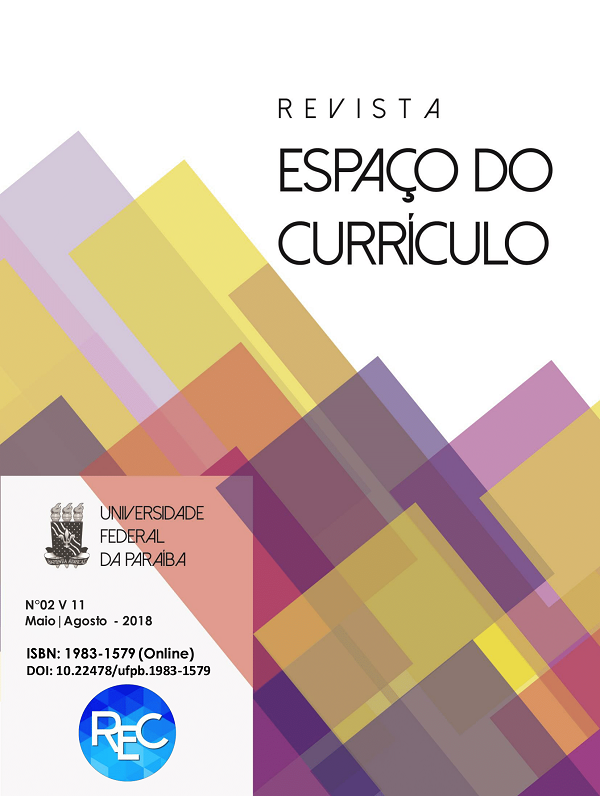COMMON CURRICULUM FOR FUNDAMENTAL EDUCATION IN BAURU-SP
in search of articulation between content and form
DOI:
https://doi.org/10.22478/ufpb.1983-1579.2018v2n11.39404Keywords:
Curriculum, School Education, Psychology, PedagogyAbstract
The curriculum is a tool for political and social struggle and resistance in defense of a free, critical, secular and quality education that promotes, in addition to appearance, the psychological and social development of students. From this perspective, this article brings a brief retrospective of the collective construction of the Common Curriculum of Elementary Education in Bauru (SP), characterized as a democratic process of reflection and elaboration of a curriculum with a political positioning for the defense of education as a driver of development and the school as the legitimate place for teaching the most elaborate forms of science, art and philosophy in order to enable human emancipation. Based on these theoretical assumptions of Historical-Cultural Psychology, Historical-Critical Pedagogy and clarification about what to teach, it questions the purpose of the educational act - why teach - with a view to the content-form unity, highlighting the transformation of consciences through the path the development of theoretical thinking and the organization of children's collectives. Finally, it lists some challenges for the materialization, in the pedagogical practice, of a curriculum of this nature, emphasizing the need to instrumentalize the teaching activity in this perspective, that is, the need to enable the appropriation of the contents of the curriculum that enables the articulation between theory and practice with a view to the humanization of school actors, the ultimate purpose of a curriculum based on this theoretical perspective.
Downloads
Metrics
References
AMARAL, C.C.F. A significação do conceito matemático de área expressa por estudantes proveniente de uma atividade orientadora de ensino. 2018. Dissertação (Mestrado em docência para educação básica) – Unesp, Faculdade de ciências, Bauru-SP, 2018.
DAVYDOV, V.; MÁRKOVA, A. La concepción de la actividad de estudio de los escolares. In: DAVYDOV, Vasili; SHUARE, Marta. La psicología evolutiva y pedagogica en la URSS: antología. Moscú: Editorial Progresso, 1987. p. 316-337.
DERISSO, J.L. Luta de Classes, Trabalho Docente e Pedagogia Histórico-Crítica na Educação Escolar in Germinal: Marxismo e Educação em Debate, Salvador, v. 5, n. 2, p. 47-58, dez. 2013.
GAMA, C. N. Princípios curriculares à luz da pedagogia histórico-crítica: as contribuições da obra de Saviani. Tese (Doutorado em educação) – Faculdade de Educação da Universidade Federal da Bahia, Salvador, 2015.
MALANCHEN, J. Cultura, Conhecimento e currículo: contribuições da pedagogia histórico-crítica. Campinas: Autores Associados, 2016.
MARX, K. O Capital: Crítica da Economia Política. Livro Primeiro: o processo de produção do Capital. Tomo 1. 2a. edição. Abril Cultural, São Paulo, 1985.
MESQUITA, A. M. FANTIN, F.C.B. ASBAHR, F. F.S. (Org.) Currículo Comum para o Ensino Fundamental. 2ed.Bauru: Prefeitura Municipal de Bauru, 2016.
OLIVEIRA, B. O trabalho educativo: reflexões sobre paradigmas e problemas do pensamento pedagógico brasileiro. Campinas, SP: Autores Associados, 1996.
PASQUALINI, J.C. Contribuição ao debate sobre o problema da preparação para a Escola de Ensino Fundamental na Educação Infantil. Teoria e Prática da Educação, v. 17, p. 93-106, 2014.
PASQUALINI, J.C.; TSUHAKO, Y. N. (Org.). Proposta pedagógica da Educação Infantil do Sistema Municipal de Ensino de Bauru/SP. 1ed.Bauru: Secretaria Municipal de Educação-Bauru, 2016, v. 1, p. 723-733.
RUBTSOV, V. V. A atividade de aprendizado e os problemas referentes à formação do pensamento teórico dos escolares. In.: GARNIER, C.; BERNARZ, N.; ULANOVSKAYA, I. Após Vygotsky e Piaget: perspectivas social e construtivista - escolas russa e ocidental. Porto Alegre, RS: Artes Médicas, 1996, p. 129-137.
SANTOS, S.M.P. Sentidos e significados do conceito de divisão provenientes da atividade orientadora de ensino. 2016. Dissertação (Mestrado em docência para educação básica) – Unesp, Faculdade de ciências, Bauru/SP 2016.
SAVIANI, D. Educação: do senso comum à consciência filosófica. São Paulo, Cortez; Autores Associados, 1980.
SAVIANI, D. Pedagogia Histórico-Crítica: Primeiras aproximações. 9a. edição - Campinas, SP: Autores Associados, 2005.
SAVIANI, D. A Materialidade da Ação Pedagógica e os Desafios da Pedagogia Histórico-Crítica in Pedagogia Histórico-Crítica: Primeiras aproximações. 9a. edição - Campinas, SP: Autores Associados, 2005.
SAVIANI, Dermeval. História das ideias pedagógicas no Brasil. 3. ed. rev. Campinas: Autores Associados, 2010.
SAVIANI, D. Pedagogia Histórico Crítica: Primeiras Aproximações. 11ª. ed. Ver. 1ª. reimpr - Campinas, SP: Autores Associados, 2012.
VIEIRA PINTO, A. Sete lições sobre Educação de Adultos. 11a. edição. Cortez. São Paulo/SP, 2000.
ZAMONER, A. Contribuições da Teoria Histórico-Cultural para o currículo escolar. Anais da X ANPED SUL. Florianópolis, outubro de 2014.
Downloads
Published
How to Cite
Issue
Section
License
By submitting an article to Curriculum Space Journal (CSJ) and having it approved, the authors agree to assign, without remuneration, the following rights to Curriculum Space Journal: first publication rights and permission for CSJ to redistribute this article. article and its metadata to the indexing and reference services that its editors deem appropriate.
















